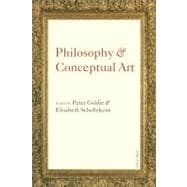
Note: Supplemental materials are not guaranteed with Rental or Used book purchases.
Purchase Benefits
What is included with this book?
| List of Illustrations | p. vii |
| Introduction | p. ix |
| Conceptual Art as a Kind of Art | p. 1 |
| On Perceiving Conceptual Art | p. 3 |
| The Dematerialization of the Object | p. 18 |
| Visual Conceptual Art | p. 33 |
| Speaking Through Silence: Conceptual Art and Conversational Implicature | p. 51 |
| Conceptual Art and Aesthetic Value | p. 69 |
| The Aesthetic Value of Ideas | p. 71 |
| Kant After Le Witt: Towards an Aesthetics of Conceptual Art | p. 92 |
| Conceptual Art, Knowledge and Understanding | p. 117 |
| Matter and Meaning in the Work of Art: Joseph Kosuth's One and Three Chairs | p. 119 |
| Telling Pictures: The Place of Narrative in Late Modern 'Visual Art' | p. 138 |
| Conceptual Art and Knowledge | p. 157 |
| Sartre, Wittgenstein, and Learning from Imagination | p. 171 |
| Appreciating Conceptual Art | p. 195 |
| Artistic Character, Creativity, and the Appraisal of Conceptual Art | p. 197 |
| Creativity and Conceptual Art | p. 216 |
| Conceptual Art Is Not What It Seems | p. 238 |
| Emergency Conditionals: Art & Language | p. 257 |
| Index | p. 267 |
| Table of Contents provided by Ingram. All Rights Reserved. |
The New copy of this book will include any supplemental materials advertised. Please check the title of the book to determine if it should include any access cards, study guides, lab manuals, CDs, etc.
The Used, Rental and eBook copies of this book are not guaranteed to include any supplemental materials. Typically, only the book itself is included. This is true even if the title states it includes any access cards, study guides, lab manuals, CDs, etc.